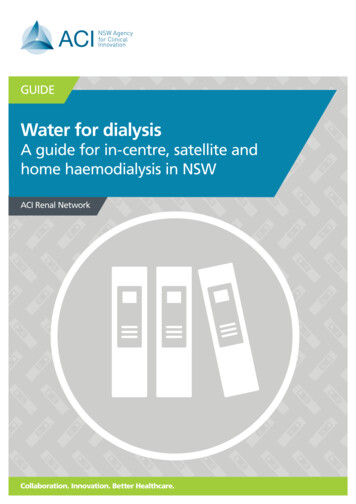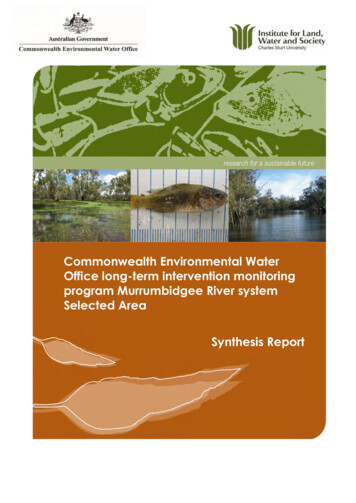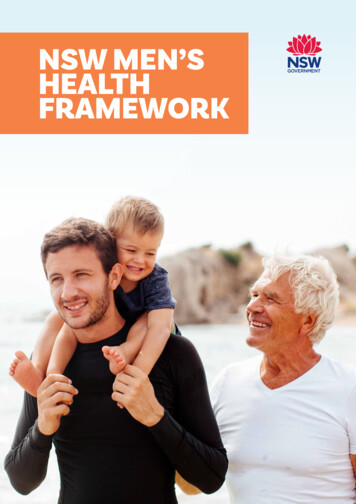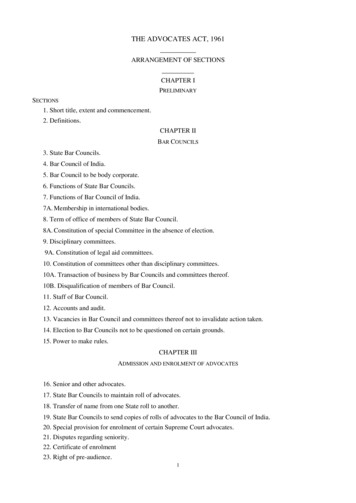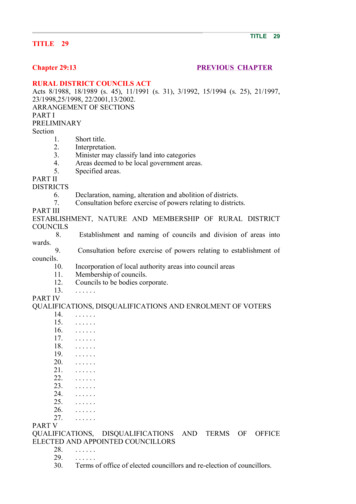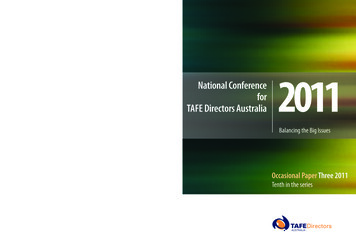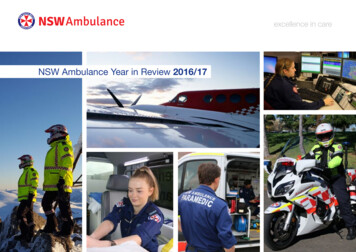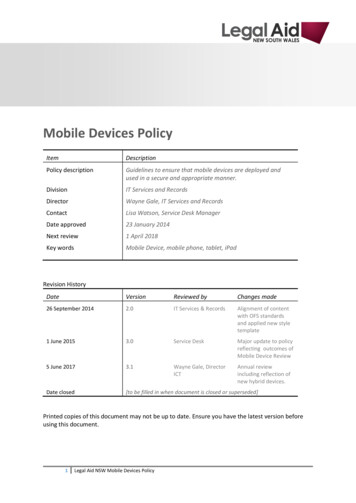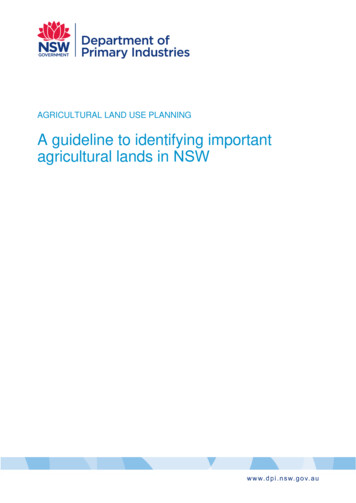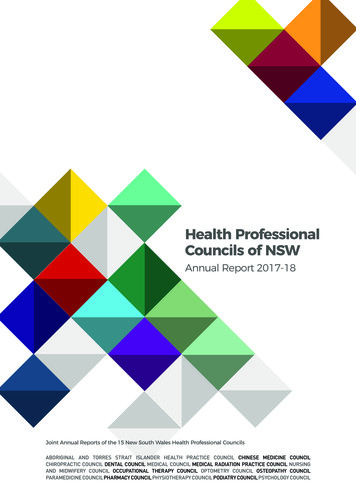
Transcription
Health ProfessionalCouncils of NSWAnnual Report 2017-18Joint Annual Reports of the 15 New South Wales Health Professional CouncilsABORIGINAL AND TORRES STRAIT ISLANDER HEALTH PRACTICE COUNCIL CHINESE MEDICINE COUNCILCHIROPRACTIC COUNCIL DENTAL COUNCIL MEDICAL COUNCIL MEDICAL RADIATION PRACTICE COUNCIL NURSINGAND MIDWIFERY COUNCIL OCCUPATIONAL THERAPY COUNCIL OPTOMETRY COUNCIL OSTEOPATHY COUNCILPARAMEDICINE COUNCIL PHARMACY COUNCIL PHYSIOTHERAPY COUNCIL PODIATRY COUNCIL PSYCHOLOGY COUNCIL
Health Professional Councils Authority (HPCA)Level 6, North Wing, 477 Pitt Street, Sydney NSW 2000Locked Bag 20, Haymarket NSW 1238Telephone: 1300 197 177Fax: (02) 9281 2030Email: mail@hpca.nsw.gov.auWebsite: www.hpca.nsw.gov.auMedical Council of New South WalesBuilding 45 Gladesville Hospital Off Punt Road Gladesville NSW 2111PO Box 104 Gladesville NSW 1675DX 22808 GladesvilleTelephone: (02) 9879 2200Fax: (02) 9816 5307Email: mcnsw@mcnsw.org.auWebsite: www.mcnsw.org.auISSN: 2205-8400 (Online) Health Professional Councils Authority of New South WalesThe work is copyright. It may be reproduced in whole or part for study and training purposes subject to the inclusion of an acknowledgement of the source. It may notbe reproduced for commercial usage or sale. Reproduction for purposes other than those indicated above requires written permission from the Health ProfessionalCouncils Authority of New South Wales or individual health professional Councils. This report can be downloaded from the HPCA and health professional Councils’websites. The total cost of layout and design was quoted at 18,300 (GST excl).Design: Raubinger Visual Communications
ForewordThe 15 NSW Health Professional Councils (Councils) present theone joint report.The Councils are:– Aboriginal and Torres Strait Islander Health Practice Council of New South Wales– Chinese Medicine Council of New South Wales– Chiropractic Council of New South Wales– Dental Council of New South Wales– Medical Council of New South Wales– Medical Radiation Practice Council of New South Wales– Nursing and Midwifery Council of New South Wales– Occupational Therapy Council of New South Wales– Optometry Council of New South Wales– Osteopathy Council of New South Wales– Paramedicine Council of New South Wales1– Pharmacy Council of New South Wales– Physiotherapy Council of New South Wales– Podiatry Council of New South Wales– Psychology Council of New South WalesThe Paramedicine Council was established by Law in February 2018 but Council memberappointments do not commence until late 2018.1The annual report is set out in three parts.Part 1 contains information relevant to all Councils, including information about the responsibilitiesof Councils, regulatory activities, governance, compliance and data reports.Part 2 contains information specific to each Council, including Council member details and Councilachievements.Part 3 contains audited financial statements specific to each Council.The full report is available on the Health Professional Councils Authority (HPCA) websitewww.hpca.nsw.gov.au.Part 1 of the report and the relevant Council specific sections of Parts 2 and 3 are available on eachCouncil’s website.The Health Professional Councils Authority has collated information provided by each Council abouttheir respective activities.The Australian Health Practitioner Regulation Agency (AHPRA) has provided registration data.New South Wales Health Professional Councils Annual Report 20183
12 October 2018The Hon. Brad Hazzard MPMinister for HealthMinister for Medical ResearchGPO Box 5341SYDNEY NSW 2001Dear MinisterThe NSW Health Professional Councils are pleased to submit their joint Annual Report and FinancialStatements for the year ending 30 June 2018 for presentation to Parliament.This is in accordance with the provisions of the Annual Reports (Statutory Bodies) Act 1984 and theFinance and Audit Act 1983.The Councils are responsible for administering the Health Practitioner Regulation National Law (NSW)and act in the interests of public safety.Yours sincerelyMr Christopher O’BrienPresidentAboriginal and Torres Strait Islander HealthPractice CouncilMs Rosemary MacDougalDeputy PresidentAboriginal and Torres Strait Islander HealthPractice CouncilProfessor Danforn LimPresidentChinese Medicine CouncilMs Christine BerleDeputy PresidentChinese Medicine CouncilDr Wayne Minter AMDeputy PresidentChiropractic CouncilDr Lawrence WhitmanConjoint Associate Professor F Shane Fryer OAMPresidentDental CouncilDr Kavita LoboDeputy PresidentDental CouncilDeputy PresidentChiropractic CouncilNew South Wales Health Professional Councils Annual Report 20184
Adjunct Associate Professor Richard WalshPresidentMedical CouncilDr John SammutDeputy PresidentMedical CouncilMs Tracy VitucciPresidentMedical Radiation Practice CouncilDr Karen JovanovicDeputy PresidentMedical Radiation Practice CouncilAdjunct Professor John G Kelly AMPresidentNursing and Midwifery CouncilDr Bethne HartDeputy PresidentNursing and Midwifery CouncilMr Kim NguyenPresidentOccupational Therapy CouncilMs Carolyn FozzardDeputy PresidentOccupational Therapy CouncilMr Albert LeePresidentOptometry CouncilMs Pauline O’ConnorDeputy PresidentOptometry CouncilMs Anne CooperPresidentOsteopathy CouncilDr Kerrin MurnaneDeputy PresidentOsteopathy CounciMs Asha MearsExecutive Officer *Paramedicine CouncilNew South Wales Health Professional Councils Annual Report 20185
Mr Stuart LuddingtonPresidentPharmacy CouncilMr Adrian LeeDeputy PresidentPharmacy CouncilProfessor Darren RivettPresidentPhysiotherapy CouncilMs Elizabeth WardDeputy PresidentPhysiotherapy CouncilMr Luke TaylorPresidentPodiatry CouncilDr Kristy RobsonDeputy PresidentPodiatry CouncilMs Gail PurkisPresidentPsychology CouncilAssociate Professor Christopher WilcoxDeputy PresidentPsychology Council* Signed by the Executive Officer of the Paramedicine Council pending appointment of Council members.New South Wales Health Professional Councils Annual Report 20186
ContentsPART 1PageNSW Health Professional Councils and Co-regulation10About the CouncilsCharterResponsibilitiesCouncil MembershipFunding11About the Health Professional Councils Authority12RegistrationRegistered Health PractitionersRegistered Students13Regulation of NSW Health Practitioners in 2017/18 – Snapshot16Regulatory ActivityComplaints about NSW Health PractitionersMandatory NotificationsComplaints about StudentsSource of ComplaintsTypes of ComplaintsManaging ComplaintsImmediate Action Under s150 of the National LawComplaints Referred for Council ManagementRegulatory Committees and PanelsAssessments and HearingsNSW Civil and Administrative Tribunal (NCAT)Outcomes for Closed ComplaintsMonitoring and Compliance with Orders and Conditions17Five Year Trends 2013/14 to 2017/18Trend in Complaints ReceivedTrend in Mandatory NotificationsTrend in Source of ComplaintsTrend in Performance, Conduct and Health StreamsTrend in Immediate Action MattersTrend in Complaints Referred for Management by CouncilsTrend in Monitoring35Strategic Planning40Communications42Governance and ComplianceLegislative ChangesAudit and Risk managementInternal AuditInsurancesInformation Management and SystemsDigital Information Security Annual Attestation StatementExemptions from Reporting Provisions and Triennial ReportsHuman ResourcesConsultants43New South Wales Health Professional Councils Annual Report 20187
Contents continuedGovernance and Compliance continuedFinancial ManagementPrivacyComplaints about Councils’ Administrative ProcessesPublic Interest DisclosuresGovernment Information Public AccessGlossary60Abbreviations63List of Tables and Graphs64Index66PART 2Reports from Health Professional CouncilsAboriginal and Torres Strait Islander Health Practice Council of New South WalesChinese Medicine Council of New South WalesChiropractic Council of New South WalesDental Council of New South WalesMedical Council of New South WalesMedical Radiation Practice Council of New South WalesNursing and Midwifery Council of New South WalesOccupational Therapy Council of New South WalesOptometry Council of New South WalesOsteopathy Council of New South WalesParamedicine Council of New South WalesPharmacy Council of New South WalesPhysiotherapy Council of New South WalesPodiatry Council of New South WalesPsychology Council of New South Wales67PART 3Financial Statements for Health Professional CouncilsAboriginal and Torres Strait Islander Health Practice Council of New South WalesChinese Medicine Council of New South WalesChiropractic Council of New South WalesDental Council of New South WalesMedical Council of New South WalesMedical Radiation Practice Council of New South WalesNursing and Midwifery Council of New South WalesOccupational Therapy Council of New South WalesOptometry Council of New South WalesOsteopathy Council of New South WalesParamedicine Council of New South WalesPharmacy Council of New South WalesPhysiotherapy Council of New South WalesPodiatry Council of New South WalesPsychology Council of New South WalesNew South Wales Health Professional Councils Annual Report 20181888
PART 1Overview,Regulatory Activity,Governance andComplianceNSW Health Professional Councilsand Co-regulationAbout the CouncilsAbout the Health ProfessionalCouncils AuthorityRegistrationRegulation of NSW HealthPractitioners in 2017/18 – SnapshotRegulatory ActivityFive Year Trends 2013/14 to 2017/18Strategic PlanningCommunicationsGovernance and ComplianceGlossaryAbbreviationsList of Tables and GraphsIndexNew South Wales Health Professional Councils Annual Report 20189
Part 1: Overview, Regulatory Activity, Governance and ComplianceNSW Health ProfessionalCouncils and Co-regulationNSW Health Professional Councils (Councils) have a publicprotection responsibility.This is achieved through regulation of NSW based health practitioners, including managingcomplaints (or notifications) about health practitioners.The Councils operate: in partnership with the Health Professional Councils Authority (HPCA) in collaboration with the NSW Health Care Complaints Commission (HCCC) as part of the National Registration and Accreditation Scheme (NRAS)Under the NRAS, National Health Professional Boards and the Australian Health PractitionerRegulation Agency (AHPRA) handle registration of health practitioners Australia wide and alsonotifications about health practitioners in most states and territories of Australia.The Councils are co-regulators under the NRAS.Co-regulatory arrangements under theNational Registration and Accreditation Scheme (NRAS)Registration ofAustralian healthpractitioners andmanagement ofnotificationsexcept for NSWRegulation of NSWhealth practitionersincluding managementof complaints(or notifications)NSW Councilsand HPCAHCCCNew South Wales Health Professional Councils Annual Report 2018National Boardsand AHPRA10
Part 1: Overview, Regulatory Activity, Governance and ComplianceAbout theCouncilsCharterEach of the 15 Councils is an independent statutory body constituted under the Health PractitionerRegulation National Law (NSW) (National Law) exercising the powers, authorities, duties andfunctions set out in the National Law.ResponsibilitiesCouncils have a responsibility to protect public safety and wellbeing. This includes managingcomplaints that relate to the conduct, performance and health of registered health practitionersin NSW. Councils also manage conduct and health matters involving registered students in NSWtraining programs.The Councils and the HCCC jointly assess complaints to decide how each complaint shouldbe managed. The HCCC is a separate statutory authority established under the Health CareComplaints Act 1993.Councils act in the interests of the public by ensuring that registered practitioners are fit topractise and registered students in approved programs of study are fit to have contact withmembers of the public.The Councils manage a range of programs, services and processes that support their objectives.These also provide the public with assurance that registered practitioners are maintaining properand appropriate standards of conduct and professional performance.The Pharmacy Council has an additional role of regulating pharmacy ownership and isrequired to maintain a register of NSW pharmacies.Council MembershipThe National Law and the Health Practitioner Regulation (New South Wales) Regulation 2010 setsout the composition of individual Councils.Council members (members) are appointed by the Governor, except for half of the PharmacyCouncil members who are elected. The term of appointment is three years and a member mayserve up to a maximum of nine years.Part 2 of this report includes membership details for each Council.FundingNSW Councils are funded through a portion of registration fees paid to AHPRA by healthpractitioners who identify NSW as their principal place of practice. Councils also receive a portionof fees collected from practitioners who do not identify a principal place of practice.New South Wales Health Professional Councils Annual Report 201811
Part 1: Overview, Regulatory Activity, Governance and ComplianceAbout the HealthProfessional CouncilsAuthorityThe HPCA is an executive agency of the NSW Ministry of Health(MoH) and works in partnership with the Councils. The HPCAprovides shared executive and corporate services to support theCouncils’ regulatory purpose.All employed staff that work directly and indirectly with Councils are employed by the HPCA. Underthe National Law Councils cannot employ staff.The HPCA also liaises with: The Ministry of Health to provide advice and responses to the Minister for Health and theSecretary on regulatory matters, member appointments and other operational functions The HCCC on complaints management issues The Australian Health Practitioner Regulation Agency (AHPRA) regarding finances,research, registration and reporting matters.The HPCA’s shared services assist Councils to achieve efficiencies that would not be possibleif each Council had to establish its own service support structure.Three year Service Level Agreements (SLAs) to 2019 are in place with all Councils. The SLAs define thescope and quality of services that Councils can expect, within the constraints of available resources.New South Wales Health Professional Councils Annual Report 201812
Part 1: Overview, Regulatory Activity, Governance and ComplianceRegistrationRegistered Health practitionersInformation about registration and health practitioner numbers provides context for the Councils’regulatory work.AHPRA maintains the National public register of health practitioners which is available on thewebsite www.ahpra.gov.au. HPCA sources registration information from AHPRA.Table 1 provides information about the number of health practitioners who primarily practise inNSW; the total number of health practitioners in Australia; and NSW practitioners as a percentageof all Australian practitioners.Table 1: Registered health practitioners by profession as at 30 June 2018Profession1Aboriginal and Torres StraitIslander Health PracticeNSW registeredpractitionersTotal Australianregisteredpractitioners% of Australianregisteredpractitioners withNSW PPP212964120.1%Chinese ical Radiation 0,734370,31927.2%8,02428,27728.4%Occupational 32.9%Total 2017/18202,033702,74128.7%Total 2016/17196,605678,93829.0%NursingNursing and Midwifery4PodiatryPsychology3Notes:1No paramedicine practitioners were registered in 2017/18 as registration for this profession does not commence until 2018/19.2PPP refers to ‘principle place of practice’.3Registrants who hold dual registration as both a nurse and a midwife.4The term ‘podiatrist’ refers to both podiatrists and podiatric surgeons unless otherwise specified.New South Wales Health Professional Councils Annual Report 201813
Part 1: Overview, Regulatory Activity, Governance and ComplianceRegistration continuedHealth practitioner numbers are growing by roughly 3% each year and NSW health practitionersconsistently make up around 29% of all registered health practitioners in Australia.Number of Registered PractitionersGraph 1: Increasing number of registered health 5/162016/172017/18Australian registered health practitionersNSW registered health practitionersProportion of registered health practitioners in Australia that practise in NSW28.7%71.3%Registered health practitioners in NSW 28.7%Registered health practitioners in other states and territories 71.3%Registered practitioner numbers vary significantly between the professions.Aboriginal and Torres Strait Islander Health Practice (ATSIHP) has the lowest number ofpractitioners and Nursing and Midwifery has the highest number of practitioners.No paramedicine practitioners were registered in 2017/18 as registration for this profession is notdue to commence until 2018/19.Registered practitioners in NSW by profession as a percentage of total NSW registered practitionersNew South Wales Health Professional Councils Annual Report 201814
Part 1: Overview, Regulatory Activity, Governance and ComplianceRegistration continuedRegistered StudentsStudents in programs of study for 13 of the regulated health professions are also registered. ThePsychology Board of Australia does not register students but instead has provisional registrationfor new graduates. Paramedicine registration did not apply in 2017/18.NSW students registered across the health professions make up 25.9% of student registrationsAustralia wide. Figures are based on where students reside.Student registration data is identified separately to data about registered practitioners. Students donot pay registration fees and are not published on the National Register.Table 2: Registered students in 2017/18Students by profession1RegisteredNSW1 StudentsAboriginal and Torres Strait Islander Health PracticeTotalRegisteredStudents inAustraliaNSW Studentsas % ofAustralianStudents7749015.7%Chinese al7983,73121.4%Medical5,87620,27229.0%Medical Radiation 718,47229.2%4481,48230.2%Total 2017/1841,790161,11425.9%Total nal TherapyPodiatryNotes:1NSW students are based on the recorded residential state of students.NSW students that have not provided a valid residential state may not be captured in the NSW data but are captured in AHPRA’stotal registered student numbers.Student figures are the number of students reported to be in an approved program of study/clinical training program in thefinancial year. This may include ongoing students or students completing study within the period. Education providers submit thisdata to AHPRA.Approved programs of study refer to courses approved by a National Board and leading to general registration.Clinical training is any form of clinical experience that does not form part of an approved program of study.Psychology students are not included in the table as they are not registered. New psychology graduates work under provisionalregistration instead.New South Wales Health Professional Councils Annual Report 201815
Part 1: Overview, Regulatory Activity, Governance and ComplianceRegulation of NSW Health Practitioners in 2017/18SNAPSHOTPractitioner informationComplaints received702,7413,8384,61064.5%Australian registeredhealth practitionersof NSW practitionerswere subject of acomplaint (1.9%)complaints werereceived including:of complaints related toperformance28.7% of Australianhealth practitioners arein NSW (n 202,033)65.7% of complaintswere from patients,relatives or generalpublic (n 3,031)19.6% of complaintswere from employers,health professionals,or self-reports (n 904)362 mandatorynotifications (7.9%) and28.2% conduct and7.3% health424 requiring immediateaction (9.2%)60.5% of complaints(n 2,793) were about: clinical care (n 1,880) pharmacy/medicationissues (n 529) communications(n 384)Complaints managed1,5964,240new complaints weremanaged directly byCouncils after consultationwith the HCCCcomplaints were closedduring the yearthat is 34.6% ofcomplaints received2,541 complaintsremained open at theend of the year2,171 open complaintswere carried over fromthe previous year1,174297Assessmentsand hearing wereconcluded by Councilsoutcomes involvedcancelled, suspended,surrendered registrationor conditions on practiceComplaints monitored852practitioners were beingactively monitored byCouncils at the end of theyear including:165 performance matters369 conduct matters318 health matters197 outcomes involvedcounselling or interviewwith a practitionerNew South Wales Health Professional Councils Annual Report 201816
RegulatoryActivityComplaints about NSW Health PractitionersAny individual or agency can make a complaint about a registered health practitioner orregistered student through the Councils, the HCCC or AHPRA.The Health Care Complaints Act 1993 requires Councils and the HCCC to advise each other aboutcomplaints received and to consult about the action to be taken. A complaint made to a Council isdeemed to be also made to the HCCC and vice versa. Complaints about NSW practitioners madethrough AHPRA are automatically transferred to the Councils and HCCC.Most practitioners are professional and competent, so complaints are made about only a verysmall proportion of registered health practitioners. This year complaints were made about 1.9% ofNSW health practitioners overall.All NSW Councils have the same regulatory responsibilities. However, larger numbers ofpractitioners in a profession generally mean the council has a greater number of complaints tomanage than Councils responsible for professions with smaller numbers of practitioners.Also risk profiles vary for each profession. Differences in the nature of work contribute to this, forexample more invasive procedures mean higher risks. Other factors can include settings wherepractitioners work, for instance practitioners in the private sector or solo practices may havegreater risks when compared with practitioners in public health services who can access advicefrom other health practitioners, supervision and support systems.Despite the relatively low incidence of complaints, the regulatory bodies and the work they dois critical to safe health service delivery and public protection.Table 3 provides an overview of complaints about health practitioners by profession, including thenumber of complaints open at the beginning and the end of 2017/18; the number of complaintsreceived during the year; the number of practitioners subject of complaint; and the percentage ofNSW practitioners that had a complaint made about them.New South Wales Health Professional Councils Annual Report 201817
Part 1: Overview, Regulatory Activity, Governance and ComplianceRegulatory Activity continuedTable 3: Overview of NSW complaints 2017/18ProfessionAboriginal andTorres StraitIslander HealthPracticeNumber ofcomplaintsreceived in2017/18Number ofcases openat 1/7/17Number ofcomplaintsclosed in2017/18Number ofcases open at30/6/18Number ofpractitionerswithcomplaintsreceived in2017/18Practitionerswith acomplaint in2017/18 as %of registeredpractitionersin odiatryPsychologyTotal 2017/18Notes:Data includes mandatory notifications.1Includes midwifery complaints about practitioners with registration as both midwife and nurse2Includes nursing complaints about practitioners with registration as both nurse and midwifeAs no complaints about Aboriginal and Torres Strait Islander Health Practitioners orstudents were received or open in 2017/18, this profession is not included in any furthertables presenting complaints data in this report.New South Wales Health Professional Councils Annual Report 201818
Part 1: Overview, Regulatory Activity, Governance and ComplianceRegulatory Activity continuedMandatory NotificationsHealth practitioners, employers and education providers must comply with the National Law andmake mandatory notifications to AHPRA if they believe a practitioner’s behaviour amounts tonotifiable conduct. AHPRA then refers these matters to a Council if the mandatory notification isabout a NSW practitioner.Notifiable conduct includes:§Practising while intoxicated by alcohol or drugs§Sexual misconduct in connection with the practice of the profession§Placing the public at risk of harm because of a significant departure from accepted professionalstandards§Placing the public at risk of substantial harm because of a health issue or impairment.Table 4 shows mandatory notifications received during the year; the number of practitioners aboutwhom mandatory complaints were made; and the percentage of complaints received that weremandatory notifications.Table 4: Mandatory notifications received about practitioners 2017/18ProfessionNumber ofMandatory notificationsMandatory notifications practitioners subject of as % of all complaintsmandatory notification received by professionChinese 41441.2%23421833.0%Occupational gy882.7%3623327.9%MedicalMedical Radiation PracticeMidwiferyNursingTotal 2017/18New South Wales Health Professional Councils Annual Report 201819
Part 1: Overview, Regulatory Activity, Governance and ComplianceRegulatory Activity continuedComplaints about StudentsComplaints may be made about the conduct or health of registered students and mandatorynotifications are required where a student has an impairment that could place the public atsubstantial risk of harm.Table 5 provides information specific to complaints about students.Complaints about students are also included in the overview of NSW complaints in Table 3 andmandatory notifications information in Table 4.Table 5: Complaints and mandatory notifications received about health professional students2017/18ProfessionNumber of complaints and mandatorynotifications about studentsChinese Medicine-Chiropractic1Dental2Medical9Medical Radiation Health Practice1Midwifery1Nursing14Occupational -Podiatry1Psychology-Total 2017/18New South Wales Health Professional Councils Annual Report 20183620
Part 1: Overview, Regulatory Activity, Governance and ComplianceRegulatory Activity continuedSource of ComplaintsAnyone can make a complaint about a health practitioner. However patients are most frequentlythe complainant, followed by relatives. This year the next highest number of complaints camefrom employers, then other practitioners and members of the public.Tables 6 provides information about source of complaints.Total Medical RadiationPracticeMedicalDentalChiropracticChinese MedicineNotification sourceTable 6: Source of complaints received 32216135Council1211104-18-1-24-22156Courts / Coroner---7--2-------9Drugs and -4Lawyer--119--1-------21Member of the1public-1019109-1691-1476333299Other practitioner2117171-248214186326301Patient98263 ting3practitioner-11434-24422-71-181253145425 2,59912347072528153125427AHPRA2Total 2017/18110 1,941296 4,610Notes:1Includes unpaid carers; friends of patient or practitioner; students.2Includes other service providers; colleagues.3Includes practitioners treating the patient or treating the practitioner.New South Wales Health Professional Councils Annual Report 201821
Part 1: Overview, Regulatory Activity, Governance and ComplianceRegulatory Activity continuedTypes of ComplaintsComplaints about health practitioners are made for various reasons. Complaints about clinical careare the most frequent. During the year the next most frequent complaints were about pharmaceuticalor medication issues, followed by communications.Table 7 provides information about the types of complaints received during the year for eachhealth profession.Total opathyOptometryOccupational TherapyNursingMidwiferyMedical Radiation PracticeMedicalDentalChiropracticComplaint categoryChinese MedicineTable 7: Type of complaints received -4141141210133Boundary violation229117--384-5191129227Clinical care75271 1,2984231643121521-66 iality1114111162--73-2599Conflict of 114Documentation115181--124-112123232Health impairment12312324173-1-121224348Infection /hygiene--218--1-21--2-35Informed 1---1-310National Law breach6122928322612212-311137National Law offence1
123fifi 2fi2fiˆ 2fifi 3 The 15 NSW Health Professional Councils (Councils) present the one joint report. The Councils are: - Aboriginal and Torres Strait Islander Health Practice Council of New South Wales - Chinese Medicine Council of New South Wales - Chiropractic Council of New South Wales - Dental Council of New South Wales - Medical Council of New South Wales
